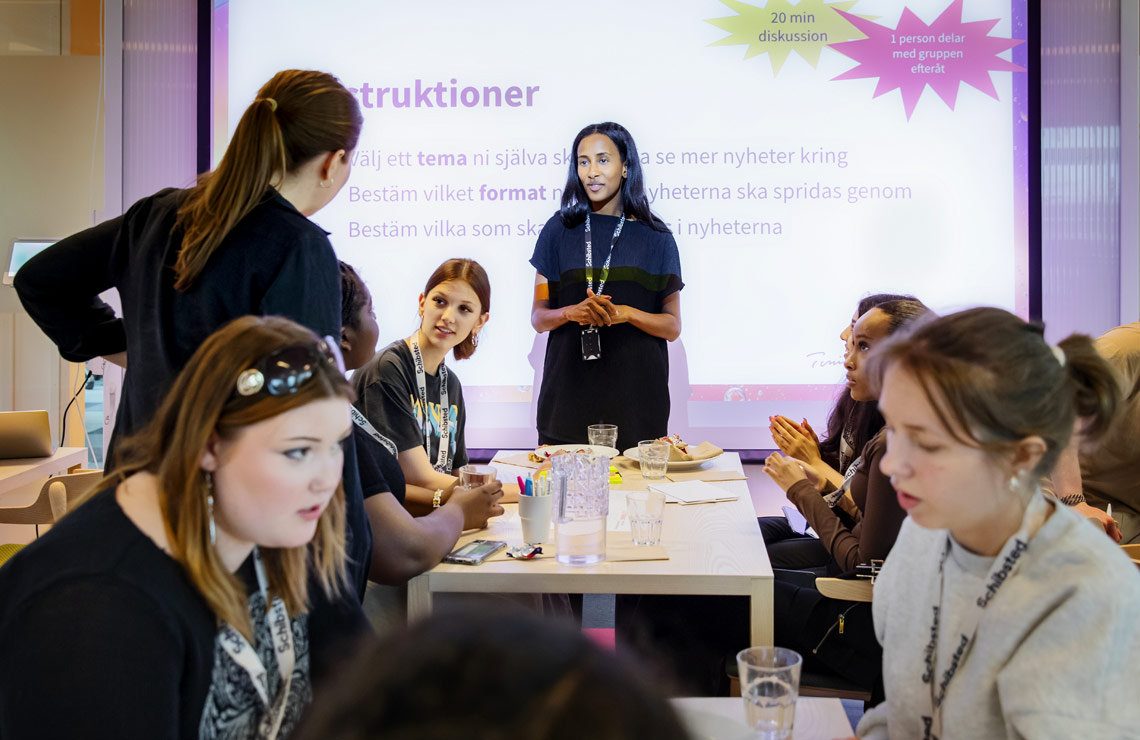
IN/LAB, a new initiative within Tinius Trust, running a workshop about future news experiences with summer workers from the local media house Fanzingo.
IN/LAB is using experiments to reach news outsiders
For a long time, the Scandinavian countries have been ahead of the game when it comes to freedom of speech and of the press. But today, large groups in society don’t consume fact-based journalism. To reach these “news outsiders” Schibsted and Tinius Trust established IN/LAB.
According to the 2022 edition of the Digital News Report (DNR) by the Reuters Institute for the Study of Journalism, 38% of global media consumers avoid the news (up from 29% in 2019). In Sweden and Norway, these numbers are 32% and 28%, respectively.
Independent news journalism plays a crucial role in serving people with fact-based information about the world around them. But if that journalism isn’t getting through to diverse groups in society, we have a big problem.
Future opportunities
To help Schibsted reach groups in society where the current consumption of independent news journalism is low, Schibsted and the Tinius Trust (Schibsted’s majority owner) established a joint venture in 2022: IN/LAB.
IN/LAB is here to prototype possible new(s) futures. To do that, we believe that we must dare to engage with truly divergent perspectives – not to legitimise, but to understand.
We use design thinking to turn insights about perceived pain points into future opportunities. In this, we are optimistic about emerging technologies and the opportunities they present for journalism. However, using it is not an end in itself. Our goal is to establish a trustful and constructive dialogue with groups we do not reach today and genuinely listen to their perspectives.
We work with specific target groups of news outsiders for various experiments. These groups vary in scope and size, based on factors such as age and gender, level of education and socio-economic status typically going into our scoping process.
Young people in the outskirts
Our first target group has been young people living in the multicultural outer city areas of Stockholm. These are areas characterised by, among other things, lower-than-average socio-economic status and residents with lower degrees of trust in society’s institutions compared to the national average.
Trust in Swedish media has been reported as increasing in the areas – but not among younger residents, who make up approximately 90,000 (under the age of 25) of the more than 250,000 people living there. We believe that this often expressed discontent and distrust in the media can have major negative consequences for the democratic and societal participation among this large group of young people.
We decided to work with 15- to 25-year-olds in the outer city areas who express a critical attitude towards news media. What are their perspectives on news journalism? What would we need to do differently to attract them as future consumers?
We have conducted in-depth interviews at local cafés, playgrounds and park benches and run creative workshops – always encouraging participants engage and express themselves in ways that are comfortable and relevant for them.
Three pain points
Through our research, we have identified three pain points in our target group’s current perspectives on news journalism:
They think that the news media shares unfair and inaccurate depictions of their residential areas and topics of importance to them.
They argue that there are too few perspectives, and too much opinion, in current news journalism. They want to make up their own minds based on facts – and not be fed other people’s opinions.
They have an instrumental approach to news but find the tools to be broken. If they can’t trust nor use what’s in the news, why consume it?
While in some ways a niche target group, we believe their expressed attitudes are critical to consider also from a broader Gen Z-perspective.
The bigger picture
Fundamentally, IN/LAB is concerned with the role that independent journalism plays in a liberal democracy. Because, as phrased by Hannah Arendt: “what makes it possible for a totalitarian or any other dictatorship to rule is that people are not informed”.
We want to turn insights about the realities of current news outsiders into future opportunities for Schibsted, our brands, and our users. To do that, we believe that empathy is our most important skill.

Belenn Rebecka Bekele
Community Researcher, IN/LAB
Years in Schibsted: 0.5

Agnes Stenbom
Head of IN/LAB
Years in Schibsted: 4.5